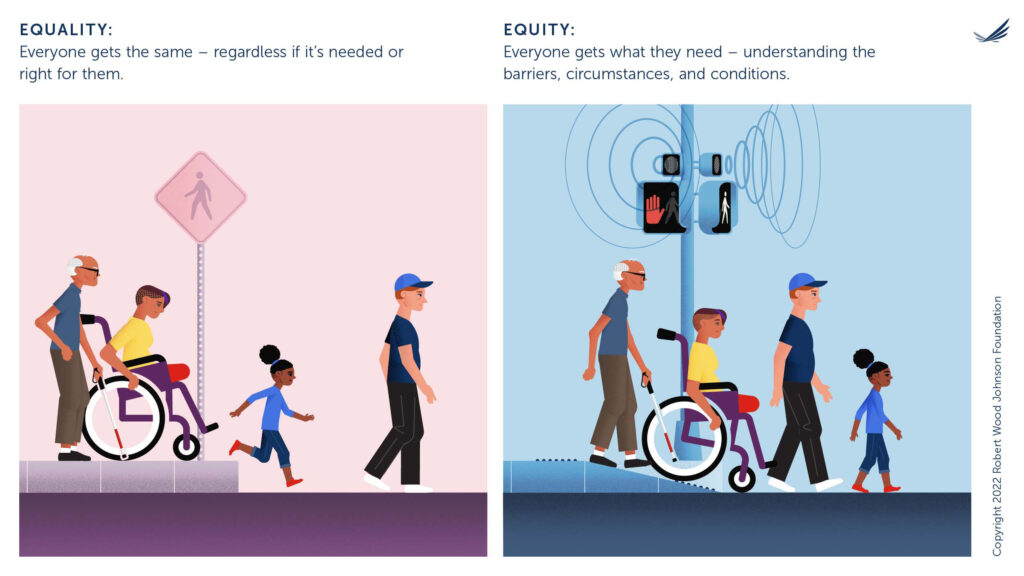What is “Health Equity”?
Health equity means that all people are able to experience the highest level of health possible regardless of their identity or background. It goes beyond reducing health disparities in a population; it means guaranteeing access, opportunity, and resources for all to thrive, irrespective of race, class, age, gender, sexual orientation, disability, location, or ethnicity. Health equity calls for a commitment to dismantling systemic barriers to health and ensuring resources are distributed to accommodate individuals’ diverse experiences and needs.
Pursuing Health Equity
Achieving health equity is more than just reducing disparities; it necessitates dismantling systemic barriers and fostering inclusivity at every level of community health and across the various determinants of health, such as housing, education, employment, and health care. Public health, policymakers, and community organizations can play a transformative role in advancing equity by implementing policies and practices that address the root causes of health disparities1. This includes investing in community-based health interventions that are culturally competent and meaningfully engage historically marginalized populations. By embracing a comprehensive approach that connects individual health, social influences, and systemic issues, we can begin to undo the complexities of health inequities and work toward meaningful solutions.

Using Data to Advance Health Equity
One of the primary goals of the Whatcom Community Health Insights (WCHI) data platform is to advance equity by identifying health disparities through analyzing differences among subpopulations when the data is available. By prioritizing health equity in data analysis, the platform can be used to identify problems, allocate resources, and target interventions for those in greatest need. Data serves as a foundation for understanding population health and contextualizing factors that promote or hinder health. Advancing health equity involves careful and unbiased scrutiny of how information is collected, interpreted, and utilized. This includes recognizing the historical injustices and systemic biases embedded in data practices. Addressing public health equity issues requires new, inclusive data methods to ensure everyone’s well-being is considered. For data to be effective, it must provide accurate and timely information about all population groups and their level of access to good health and well-being.
Data Collection Challenges and Inequities
One of the most significant challenges in navigating public health data is the inequities in how data is collected and managed. Since data are produced through human decision-making, they include the bias and error that inherently come with those decisions.
“Data is a representation of the world, but that representation is only partial, and has been assembled through human choices about what (and what not) to record2”.
Historical biases, systemic racism, and inadequate representation all contribute to limitations in fully understanding health outcomes, particularly for historically marginalized communities. For instance, American Indian and Alaska Native (AI/AN) peoples often face misclassification in health datasets, and are often classified as other races, leading to underestimations of health disparities and impacting efforts to address their unique needs. The complexity of AI/AN identity, combined with legal definitions, tribal enrollment, and tribal sovereignty, further complicates data collection and reporting3.
Similarly, data collection practices impact our ability to understand the health outcomes for other people of color, lesbian, gay, bisexual, transgender, queer (LGBTQ+) populations, and individuals with disabilities. methods often lack details or altogether overlook information about these groups. Additionally, data rarely factors in the accumulation of risk exposures, the legacy of injustices, and systemic barriers4. Such shortcomings highlight the importance of considering the cultural and historical context for data. Some of the information on this platform comes from data sources that don’t include details about specific subpopulations. As a result, the Whatcom County Health and Community Services (WCHCS) Data Team cannot report data on some of these groups.
The Role of Data Equity and Stewardship
Data equity and stewardship are crucial for health equity. Data equity involves recognizing power dynamics, biases, and discrimination in data collection and interpretation, ensuring historically marginalized communities are not overlooked or misrepresented5. Data stewardship focuses on ethical data management, safeguarding privacy, integrity, and transparency. Upholding principles of justice, equity, and inclusivity in data practices builds trust, promotes accountability, and empowers communities to shape their health outcomes. This requires advocating for accurate representation, respecting tribal sovereignty, and incorporating diverse perspectives into data collection and analysis.
WCHCS is dedicated to advancing public health through equitable data practices and supporting partners at all levels to enhance efforts in this crucial area. Although this platform provides data that WCHCS did not collect and is limited in its reporting capabilities, the WCHCS Data Team is committed to collaborating with community partners to develop ways to collect and utilize more comprehensive and inclusive data. We are dedicated to ongoing learning and growth and value the feedback, input, and support of our community partners to enhance our data practices.
Data can drive meaningful progress toward a healthier, more equitable future. By addressing historical inequities, challenging biases, and advocating for accurate representation, we can leverage data to promote justice and inclusivity.
Learn more:
